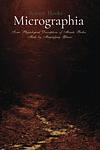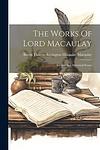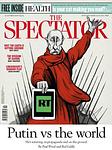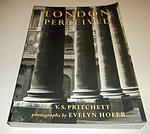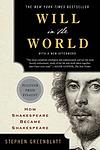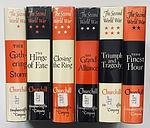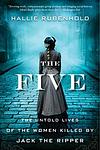The Greatest "London, History" Books of All Time
Click to learn how this list is calculated.
This list represents a comprehensive and trusted collection of the greatest books. Developed through a specialized algorithm, it brings together 300 'best of' book lists to form a definitive guide to the world's most acclaimed books. For those interested in how these books are chosen, additional details can be found on the rankings page.
Genres
The "London" category of books encompasses stories that are set in the city of London, England. These books may explore the history, culture, and people of the city, or they may use London as a backdrop for fictional tales of love, mystery, and adventure. From classic literature to contemporary fiction, the "London" category offers a diverse range of books that capture the essence of this iconic city.
The category of "History" in books refers to the study and interpretation of past events, societies, and cultures. It encompasses a wide range of topics, including political, social, economic, and cultural developments, as well as the lives of individuals and groups who have shaped the course of history. History books can be written from various perspectives and may focus on specific time periods, regions, or themes. They aim to provide readers with a deeper understanding of the past and its impact on the present.
Countries
Date Range
Reading Statistics
Click the button below to see how many of these books you've read!
Download
If you're interested in downloading this list as a CSV file for use in a spreadsheet application, you can easily do so by clicking the button below. Please note that to ensure a manageable file size and faster download, the CSV will include details for only the first 500 books.
Download-
1. Alan Turing by Andrew Hodges
This biography provides a comprehensive look at the life and work of a pioneering computer scientist and mathematician who played a crucial role in breaking the Enigma code during World War II. It delves into his groundbreaking contributions to the development of computer science, his tragic prosecution for homosexuality, and his enduring legacy in the field of artificial intelligence and computing. The book not only celebrates his scientific achievements but also examines the social context of his time, shedding light on the challenges he faced and the impact of his work on future generations.
-
2. The Last Lion by William Manchester
"The Last Lion" is a comprehensive biography of Winston Churchill, providing an in-depth look at his life, from his birth in 1874 to his death in 1965. The book covers Churchill's early years, his military service, his time as a journalist, and his political career, including his role as British Prime Minister during World War II. It also delves into his personal life, relationships, and struggles with depression. The book presents a nuanced portrayal of Churchill, highlighting his strengths, flaws, victories, and defeats.
-
3. The World Of Yesterday by Stefan Zweig
The book is a poignant memoir reflecting on the transformative events and cultural atmosphere of Europe before World War I, through the interwar years and into the rise of the Nazis. It captures the author's experiences of growing up in a vibrant pre-war Vienna, the intellectual richness and artistic achievements of the time, as well as the profound sense of loss as the world he knew disintegrated into chaos and totalitarianism. With a mix of nostalgia and despair, the narrative serves as a lament for the lost world of European culture and as a warning about the fragility of peace and the human cost of war.
-
4. Florence Nightingale by Cecil Woodham-Smith
This biography provides an in-depth look at the life and accomplishments of Florence Nightingale, a renowned nurse and social reformer. The author delves into Nightingale's personal life, her groundbreaking work in nursing during the Crimean War, and her relentless efforts to reform healthcare. The book also highlights the struggles she faced as a woman in a male-dominated society, her pioneering use of statistics in public health, and her lasting impact on modern nursing practices.
-
5. The Convert by Elizabeth Robins
"The Convert" is a thought-provoking novel that delves into the early 20th-century women's suffrage movement in England. The story follows the transformation of its protagonist, a young and well-to-do woman who becomes deeply involved in the fight for women's right to vote. As she becomes more engaged with the suffragette cause, she faces various personal and societal challenges, including the disapproval of her family and the wider public. The novel explores themes of feminism, political activism, and the personal sacrifices made by women who dared to challenge the status quo of their time. Through its vivid portrayal of the suffrage movement, the book provides a nuanced look at the complexities of social change and the power of conviction.
-
6. Dr. Johnson & Mr. Savage by Richard Holmes
This book delves into the complex friendship between the 18th-century literary figure Samuel Johnson and the enigmatic poet Richard Savage. It explores the profound influence they had on each other's lives and works, set against the backdrop of London's vibrant and often sordid literary scene. The narrative weaves a tale of two men from vastly different backgrounds who form an unlikely bond, with Johnson becoming fascinated by Savage's scandalous history and the mysteries surrounding his true identity. Through their association, the book examines themes of authorship, friendship, and the struggles of the creative life, while also painting a rich picture of the society they navigated.
-
7. Micrographia by Robert Hooke
This seminal work from the 17th century is renowned for its detailed and pioneering illustrations of the microscopic world. The author, using one of the earliest compound microscopes, meticulously documented his observations of a previously unseen universe, ranging from the structure of snowflakes and the anatomy of insects to the crystalline forms of minerals and the cellular patterns of plants. The book not only captured the public's imagination with its intricate engravings but also laid the groundwork for the field of microscopy and significantly advanced the scientific community's understanding of biology and the nature of matter.
-
8. Critical And Historical Essays by Thomas Babington Macaulay
"Critical and Historical Essays" is a collection of essays written by a 19th-century historian and politician, which were originally published in various periodicals. The essays cover a wide range of topics, including historical figures such as John Hampden, Lord Burghley, and Machiavelli, as well as literary critiques of poets and dramatists like Milton and Byron. The work is renowned for its clear, vigorous prose and its confident handling of historical and literary material, reflecting the author's political and historical insights. The essays not only illuminate the subjects they cover but also offer a window into the intellectual concerns and styles of the Victorian era.
-
9. The Spectator by Joseph Addison
"The Spectator" is a collection of daily publications from the early 18th century that offers a rich commentary on the social, political, and cultural life of England during that period. Through a series of essays and fictional correspondences, the work provides a platform for discussing various topics such as manners, literature, and public behavior. The central figure, a fictional spectator, observes and reports on the world around him, offering insights and critiques that aim to educate and entertain the readers while promoting moral virtues and enlightened thinking. The publication played a significant role in shaping the English essay as a literary form and had a lasting impact on the social discourse of the time.
-
10. Revolution in the Head: The Beatles' Records and the Sixties by Ian MacDonald
This book provides a comprehensive analysis of the Beatles' music and its cultural impact during the 1960s. It delves into the creation and significance of each track, examining the technical innovations, lyrical content, and the sociopolitical context of the era. The work offers a song-by-song breakdown, exploring how the band's evolving creative dynamics and the tumultuous decade they helped define were reflected in their recordings. It is both a critical study of the band's discography and a reflection on the revolutionary spirit of the sixties, highlighting how the group's work was intertwined with the broader changes in music, politics, and society.
-
11. London Perceived by V. S. Pritchett
"London Perceived" is a richly descriptive exploration of England's capital, delving into the unique atmosphere, culture, and character that define the city. Through a combination of keen observations and evocative prose, the book captures the essence of London's diverse districts, historic architecture, and the vibrant life of its streets. The author's perceptive insights into the people, traditions, and ever-changing face of the metropolis paint a vivid picture that is both nostalgic and timeless, offering readers a deeply personal portrayal of the city as seen through the eyes of a seasoned observer.
-
12. The Hare with Amber Eyes: A Family's Century of Art and Loss by Edmund de Waal
This book is a family memoir that traces the journey of a collection of miniature Japanese sculptures, called netsuke, through generations of a wealthy Jewish family. The narrative delves into the family's rise to prominence in the late 19th and early 20th centuries, their survival during the Nazi regime, their post-war struggles, and their eventual decline. The author uses the netsuke as a lens to explore the themes of art, loss, and family legacy.
-
13. London Labour and the London Poor by Henry Mayhew
This book provides a comprehensive look into the lives of the working poor in 19th century London. The author offers an in-depth analysis of the socio-economic conditions of the time, detailing the struggles and hardships faced by the city's lower classes. The book includes interviews with a wide range of people, from street-sellers and chimney sweeps to beggars and thieves, offering a vivid and often grim picture of Victorian London. It is considered an important social document for its first-hand account of the realities of urban poverty.
-
14. Boswell's London Journal, 1762-1763 by James Boswell
This book is a journal-style account of a young Scottish man's experiences in 18th-century London. It provides a vivid and detailed account of the social, political, and cultural landscape of the time. The author, a law student, records his interactions with notable figures of the day, his romantic pursuits, his struggles with depression, and his efforts to establish himself in London society. His observations offer unique insights into the life and times of 18th-century London.
-
15. London: The Biography by Peter Ackroyd
This book is a comprehensive exploration of the city of London, from its ancient origins to the modern era. The author delves into the city's rich history, culture, and unique character, examining its evolution through various lenses such as crime, religion, commerce, education, and entertainment. The narrative is brought to life with fascinating anecdotes, vivid descriptions, and a wealth of historical detail, providing an immersive and engaging portrait of one of the world's most iconic cities.
-
16. On Heroes, Hero Worship, & The Heroic In History by Thomas Carlyle
The book explores the influence of heroes and their impact on history, arguing that the course of history is largely determined by the actions of great men and women. The author categorizes heroes into different types, such as divinities, prophets, poets, priests, men of letters, and rulers, examining their roles and the reverence afforded to them by society. Through a series of lectures, the work delves into the characteristics of these heroes, the nature of their leadership, and their ability to inspire followers and shape the cultural and political landscapes of their times. The book asserts that hero worship is an essential part of human nature and a driving force in the development of civilization.
-
17. Will In The World: How Shakespeare Became Shakespeare by Stephen Greenblatt
"Will In The World" is a biography of Shakespeare that explores how he became one of the greatest writers in history. Stephen Greenblatt delves into the political and cultural influences of Elizabethan England, as well as the personal experiences and relationships that shaped Shakespeare's life and work. Through a combination of historical research and literary analysis, Greenblatt paints a vivid portrait of Shakespeare's world and the man who transformed it with his words.
-
18. A Journal Of The Plague Year by Daniel Defoe
This book provides a detailed account of one man's experiences during the year 1665, when the bubonic plague ravaged London. Written in the form of a journal, it blends fiction with historical fact, offering a vivid portrayal of the city's atmosphere as the disease took hold. The narrative captures the fear, confusion, and chaos of the time, as well as the various responses of the populace, from those who fled to those who stayed to face the epidemic. The author delves into the social and economic impacts of the plague, including the efforts of authorities to contain it, the plight of the poor, and the moral and religious interpretations of the calamity, providing a compelling and immersive glimpse into one of the darkest periods of London's history.
-
19. Principles Of Geology by Charles Lyell
"Principles of Geology" is a foundational text in the field of geology that introduces the concept of uniformitarianism, the idea that the earth has been shaped by the same natural processes still in operation today, occurring at a consistent rate over time. This work argues against the then-prevailing catastrophic theories which suggested that the earth had been formed through supernatural or abrupt events. By meticulously documenting geological evidence and comparing current geological processes, such as erosion and sedimentation, the book demonstrates how vast geological changes are the cumulative result of slow, continuous processes. This perspective not only revolutionized geology but also had profound implications on the contemporary understanding of natural history and the age of the Earth.
-
20. Their Finest Hour by Winston Churchill
"Their Finest Hour" is the second volume in a series of books that recount the historical events of World War II from the perspective of a key political leader. This volume focuses on the period of intense conflict in 1940, particularly detailing the Battle of Britain and the strategic decisions and leadership that were pivotal during this time. It provides an in-depth look at the challenges faced, the resilience of the British people, and the speeches that rallied a nation under siege, offering insights into military strategies and the personal resolve of the author during one of Britain's most daunting periods.
-
21. The Club by Leo Damrosch
"The Club" by Leo Damrosch is a non-fiction book that explores the lives and friendships of a group of influential men in 18th century England known as the "The Club". The members of this group included notable figures such as Samuel Johnson, Edmund Burke, and Joshua Reynolds. Through their meetings and discussions, they shaped the intellectual and cultural landscape of their time, and their legacy continues to influence modern society. The book provides a fascinating insight into the lives of these men and the impact they had on the world around them.
-
22. Red Comet: The Short Life And Blazing Art Of Sylvia Plath by Heather L. Clark
"Red Comet" is a comprehensive biography of Sylvia Plath, one of the most iconic poets of the 20th century. The book covers her life from her childhood in Massachusetts to her tragic suicide at the age of 30, exploring her relationships, her struggles with mental illness, and her groundbreaking work in poetry and prose. Through meticulous research and interviews with those who knew Plath, author Heather L. Clark offers a nuanced and illuminating portrait of a complex and brilliant artist.
-
23. Operation Mincemeat by Ben Macintyre
The book is a gripping account of one of the most successful and bizarre deception operations of World War II, orchestrated by British intelligence. It tells the true story of how British officials concocted an elaborate scheme to mislead Nazi Germany about the Allies' next strategic move by planting false information on a corpse dressed as a British officer. The body, carrying fake secret documents suggesting an Allied invasion of Greece and Sardinia, was set adrift to be found by Axis forces. The ruse, hinging on the authenticity of the planted persona and the documents he carried, aimed to divert German forces away from the actual target: Sicily. The operation's success played a crucial role in the overall Allied campaign in the Mediterranean, showcasing the ingenuity and daring of wartime espionage.
-
24. The Spy And The Traitor by Ben Macintyre
This gripping non-fiction narrative delves into the heart of the Cold War, recounting the incredible true story of Oleg Gordievsky, a high-ranking KGB officer who became the most valuable double agent for the British MI6. The book masterfully chronicles Gordievsky's secret work, which significantly altered the course of international relations, and the harrowing operation to exfiltrate him from the Soviet Union after his cover was blown. It's a tale of espionage, bravery, and betrayal, showcasing the complex moral decisions involved in the shadowy world of intelligence and counterintelligence, and highlighting the personal sacrifices made in the name of peace and security.
-
25. The Five by Hallie Rubenhold
"The Five" is a historical non-fiction book that delves into the lives of the five women who were infamously murdered by Jack the Ripper in the East End of London in 1888. The work challenges the long-standing myth that the victims were all prostitutes, instead painting a vivid picture of the harsh realities faced by women in Victorian England. Through meticulous research, the book reconstructs their personal histories, exploring their backgrounds, the societal conditions that contributed to their unfortunate fates, and the misogyny that has overshadowed their stories. The narrative serves as both a poignant tribute to these women and a critical examination of the historical narratives that have marginalized them.
Reading Statistics
Click the button below to see how many of these books you've read!
Download
If you're interested in downloading this list as a CSV file for use in a spreadsheet application, you can easily do so by clicking the button below. Please note that to ensure a manageable file size and faster download, the CSV will include details for only the first 500 books.
Download




